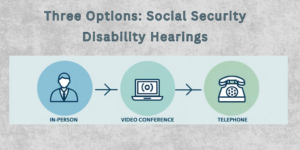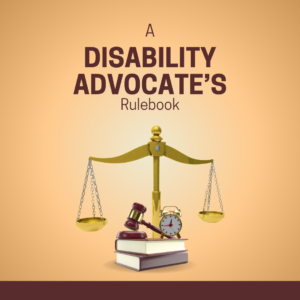Read Time: 5 Minutes
As a disability representative, I’ve seen a lot of shocking and unpredictable reasons why a claim might be denied. But I’ve also seen THOUSANDS of preventable mistakes. In particular, there are four major problems that come up time and time again. Let’s dig in so we can get YOUR application off to a strong start! 💪
Confusion About Your Job Skills
This is one of the things that has always amazed me as a disability representative: early in the process, the SSA will send their applicant a work history report to learn about the kind of work that they’ve done–and unfortunately, many people don’t turn it in 🤯
When you don’t turn in your work history report, it becomes very difficult for the SSA to get a full picture of your work life. The records that they do have may be unclear, inconsistent, or simply not enough information for them to make a decision.
If your role is not described in detail, it could be misclassified by the SSA, which could be disadvantageous for you. That’s why it’s important to provide an accurate description of what your job involves.
- For instance, two nurses may have very different job descriptions; one might need specialized knowledge to fill prescriptions while the other may do more physical labor such as helping patients with baths and therapy. Depending on what injury or illness each of these individuals have–it could be incredibly easy or absolutely impossible for them to return to their job.
For that reason, it is SO 👏 CRUCIAL 👏 to get this form in, guys! Don’t skip it or assume that everyone knows what kind of skills or education are required to do your line of work. The SSA does NOT make assumptions.

Your Lifestyle, Hobbies, and Activities
Think of it like this: The SSA is going through an applicant’s file and gets to their medical records. The judicator then notices that a few days ago, the applicant twisted their ankle while they were out at the river.
As a judicator, what would you do? For an outsider, it’s reasonable to jump to the conclusion that the applicant was kayaking or going for a swim with some friends – but the reality might be that they were just sitting on the banks and slipped on a disability ramp 🤷
When you’re applying for disability benefits, be mindful of how you represent daily living. You should still go out and enjoy life, but remember that the SSA does have to watch for fraudulent claims. So if they see an applicant who reports that they can’t work because of debilitating pain – but then they see a medical record that mentions the same applicant was out at the river just a few days ago – it looks a little suspicious.
👉 Make sure all of your records are clear, consistent, and descriptive. Communicate with your doctor and explain to them exactly how the injury happened and ask them to create a note about the event.
Lacking Objective Medical Evidence
Let’s elaborate on that last point a bit more! Now that we’ve established the importance of creating clear medical records, here are some common issues that people have in regard to the medical industry.
- Limited Access to Care
- Absence of Specialty Care
- Poor Follow-Through
With recent Medicaid Expansion coverage, healthcare should start to feel a little more accessible. That doesn’t negate the reality that getting to/from appointments can be a big challenge.
The problem is – if you’re not in your medical appointments, then you’re missing the opportunity to have credible testimony in your application. Of course they’ll listen to your story from either yourself or your representative, but they also need a medical professional to confirm that they have overseen your care and agree that the extent of your health or injury is extensive enough to remove you from the workforce for a minimum of 12 months.

Failure to Follow Course of Care
Unfortunately, poor follow-through really is a Big, BIG problem for your case. Whether you’re skipping appointments, refusing care, or not getting your prescriptions refilled, it begs the question: how bad is your health, really, that you don’t need any assistive care??
But you’re not going to be denied from the disability program just for missing your appointments. Here are some additional concerns that could arise during their evaluation.
⭐ Would Treatments Restore Function?
This is an important question for a big reason: if treatments can restore function, then why aren’t you letting your care provider treat you?
Say, for example, you haven’t gone to physical therapy for months after getting a referral from your doctor. If SSA finds out that you’re not following through with care options and treatments recommended by your healthcare provider, they may deny disability benefits on grounds of not cooperating with the treatment plan – even if it is due to financial stressors.
⭐ Is Your Condition Treatable?
This can get even more complicated, and that’s why it’s important to work with a disability representative who can help you through the process. The SSA will take a look at the medical records and determine if the condition is “treatable.”
This means that the applicant has made efforts to try to improve their health, such as seeking medical attention, undergoing tests and treatments, or even trying home remedies. If these efforts have failed to show improvement, then your disability claim may have grounds for approval.
BONUS: What to Do If You Refuse Surgery
In conclusion – be mindful of how you represent yourself in a disability claim. Make sure all of your records are clear and consistent; follow through with treatments recommended by healthcare professionals; and make sure that you’re honest in all of your dealings with the Social Security Administration!
Here’s How Our Disability Representative Can Help!
As a local representative, our disability advocate will know your case from start to finish. We’ll be involved every step of the way, and you’ll speak to the same person every time.
For that reason, we don’t just fine-tune what you have and put it together in a cut-and-paste format. We’ll meticulously review your case and provide feedback on the weak areas of your application and offer clear directions on what information we need and where you can find them.
Whether you’ve already begun the application process or are just getting started, we encourage you to schedule a FREE consultation to help determine the best strategy for your case 🤗 Our mission is to make your case the easiest one to approve so you can focus on your health and the things that matter.
Written by Roy, a dedicated Disability Representative, has been advocating for individuals seeking disability-based programs since 2003. With his background working for the government, Roy brings a deep commitment to improving assistance programs for those in need.
⏰ Schedule an appointment from anywhere in the US! 📱
Let’s Connect!
✅ Facebook: Add Me!
✅ Instagram: Join the Fun
✅ Twitter: Follow
✅ YouTube: Subscribe Here
The Disability Process 101:
- Programs available
- How to apply or appeal
- How disability is determined
- Tips for how to build a strong case
Contact Us:
📞 417-812-6698
Ur Disability Rep
Springfield, MO 65804






